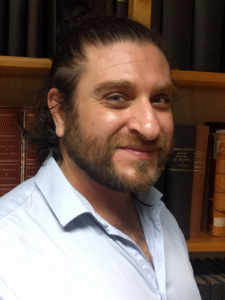Keynote: Salvatore M. Anzalone
Social Artificial Agents for Neurodevelopmental Deficits
Endowing agents with socio-cognitive skills translates mainly into two challenges: the analysis of the dynamics of social interactions between humans; the development of skills that explicitly take in account the human presence in the agent’s perception-cognition-action loop. In this presentation, I will show how a social agent can deal with people’s mental states as well with its owns. This will be achieved through the exploitation of basic socio-cognitive skills as engagement, imitation, joint attention and perspective taking, together with a fine characterization and modeling of humans’ individual differences. In the last decade, social agents were employed in the support of children with Neuro-Developmental Deficits, where social skills are impaired. In this case, social agents can assure a continuous, intensive, long-term caring of children. I will focus, in particular, on their use at school: an environment in which social agents can be used as tools to tailor teaching strategies and intensives therapies to the special needs of children.

Salvatore Maria Anzalone is Maître de Conférences at Université Paris 8 and member of the Artificial and Human Cognitions Laboratory (2016), leading the Cognition and Social Interactions group (2020). He received his Ph.D. degree in Computer Engineering from the University of Palermo (2010). He collaborates since then with several institutions in Italy (University of Padua), Japan (Osaka University) and France (Sorbonne Université and Pitié-Salpêtrière Medical Hospital). His research interests focus on Social Robotics, spanning from the analysis of interpersonal dynamics to the development of socio-cognitive behaviors, with the goal of allowing robots to express high degrees of social intelligence. He extensively worked on such topics in the specific context of socially assistive robotics for children with neurodevelopmental disorders. He was awarded as JSPS Research Fellow from the Japan Society for the Promotion of Science (2011-2012) and recipient of a grant from the Japanese National Institute of Information and Communications Technology (2013). He participated in several national and European projects such as the FP7 Michelangelo. He is currently coordinator of the French-Swiss bilateral project ANR-FNS iReCheck, co-coordinator of the French national project “Scène and Robotique” and, since 2017, part of the steering committee of the Artificial Intelligence and Robotics group of the Italian Association for Artificial Intelligence. Since 2021, he is managing editor of the Springer’s International Journal of Social Robotics.